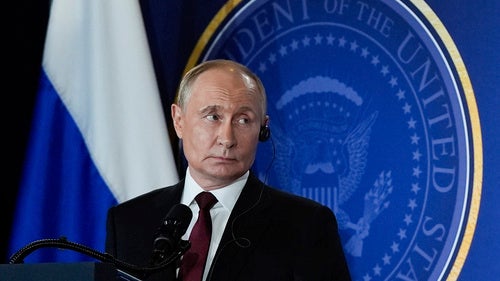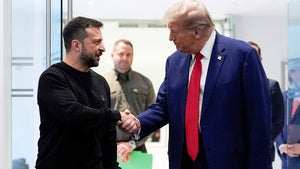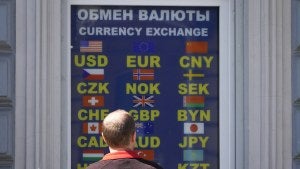Americans Reject Idea of a Russian Sphere of Influence in Europe

Most Americans believe the United States has too many interests in Europe to let any one country dominate the region.
With a show of pageantry that literally rolled out a red carpet, President Donald Trump met with Russian President Vladimir Putin in Alaska on Friday, the first between an American and Russian president since 2021. This week, Trump followed up that meeting with Ukrainian President Volodymyr Zelenskyy and several European leaders as Russia continued its assault on Ukraine. While the Trump-Zelenskyy interactions were warmer than the last time the two met in the Oval Office in February 2025, Trump stuck to his pronouncement from Alaska that a ceasefire was not part of the equation toward a peace agreement. He did promise that the United States would provide “a lot of help” to Ukraine—though the details are yet to be worked out with the Europeans.
In post-Alaska summit comments, Putin said that in order for a peace agreement to be “sustainable and long-term, all the root causes of the crisis, which have been discussed repeatedly, must be eliminated, all of Russia’s legitimate concerns must be taken into account, and a fair balance in the security sphere in Europe and the world as a whole must be restored.”
By the root causes of the war, Putin is referring to resentments he has articulated since the 2007 Munich Security Conference, including US global domination, NATO expansion to former Soviet countries in central Europe, the end of the Soviet Union, and a loss of Russian dominion over its “near abroad.”
Putin may not be the only leader interested in returning to a spheres-of-influence order. Trump’s early rhetoric in his second term, suggesting that both Canada and Greenland should become US territories, could also be interpreted in this same vein. As such, the Chicago Council on Global Affairs included a question on these themes in the 2025 annual survey of Americans on foreign policy, finding large majorities of Americans oppose using military force to invade Greenland (85%) and Canada (92%). The public was also asked how it felt about Washington ceding US dominance in Europe to Russia in exchange for the United States having free reign in the Americas. The result: nine in 10 Americans believe “the United States has too many interests in Europe to let any one country dominate the region.” As the figure below shows, this is true along all partisan lines. Only 7 percent overall believe “the United States should let Russia dominate Europe in exchange for Russia allowing the United States to dominate North and South America.”
While Trump might share some of Putin’s thoughts about regional dominance, these results show the American public does not see things in the same way. And when it comes to Ukraine, this same survey finds that a majority of Americans support continued US military aid (62%, up from 52% in March 2025) to help Ukraine defend itself as an independent, sovereign nation. A similar majority also support continued economic assistance (61 percent, up from 55% in March). The sharpest increase since March has occurred, in fact, among Republicans. Now, 51 percent of Republicans support military assistance, an increase of 21 percentage points from March, when 30 percent favored this option. Moreover, when asked last March about acceptable conditions to end the peace in Ukraine, a majority of 58 percent of Americans found the prospect of Russia keeping territory it occupies (beyond Crimea) to be unacceptable.
The details of any forthcoming peace deal will be known soon enough, if there is one to be achieved. But at least for now, the American public seems to be on the right side of history.


Related Content
 US Foreign Policy
US Foreign Policy
In a 21-point shift, 51 percent of Republicans now favor providing US military aid to Kyiv.
 Public Opinion
Public Opinion
While down slightly from last year, more than half support continuing military and economic assistance to Kyiv. But the results are highly partisan.
 Public Opinion
Public Opinion
Most believe Russia should continue to pursue an independent foreign policy despite the sanctions, which are attributed to the West’s hostility and misunderstanding of the situation in Ukraine.
 Defense and Security
Defense and Security
Although the public continues to support the military operation in Ukraine, a plurality say it has caused more harm than good for Russia.